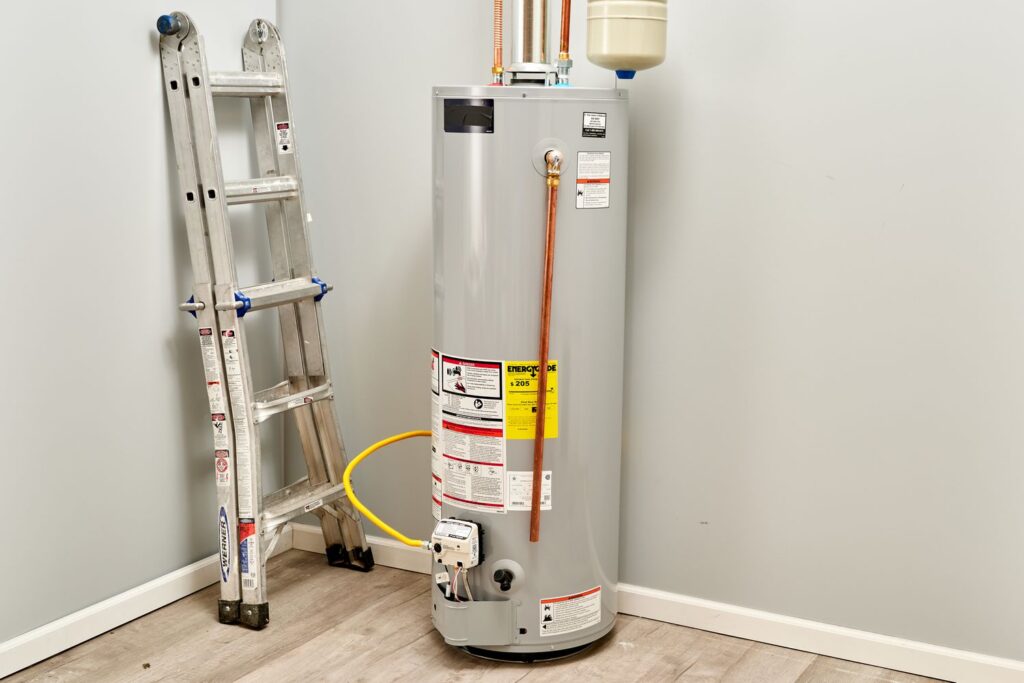If you’ve ever glanced at your boiler’s gauge and wondered whether the pressure looks right, you’re not alone.
Many Rhode Island homeowners only check when something goes wrong. Low heat, strange noises, or a sudden shutdown often push people to investigate.
The good news is, understanding boiler pressure isn’t complicated. By the end of this guide, you’ll know what pressure a combi boiler should have when the heating is on, how to spot problems, and how you can safely adjust yourself.
What Pressure Should a Combi Boiler Be When Heating Is On?
A combi boiler should typically read 1.5 to 2.0 bar when the heating is on.
Key Takeaways
- A combi boiler should usually read 1.5 — 2.0 bar when heating is on.
- Cold system pressure should sit around 1.0–1.5 bar.
- Small rises in pressure are normal, but spikes above 2.5–3.0 bar signal problems.
- Low pressure causes weak heating and hot water issues, and high pressure risks leaks.
- Homeowners in Rhode Island should check boiler pressure regularly, especially in colder months.
How Boiler Pressure Works: Cold vs Heating On

Your combi boiler runs as a sealed system, so water expands as it heats. That expansion naturally pushes pressure up.
When the system is cold, pressure should sit lower, around 1.0 to 1.5 bar. As the heating turns on, the gauge will rise by 0.5 bar or so. This jump is expected and shows the boiler is working correctly.
The gauge on the front of your boiler is your main checkpoint. Most models have green and red zones marked to help you spot safe levels quickly.
Why Pressure Rises When the Heating Is On
When water heats up, it expands. In a closed boiler system, that extra volume has nowhere to go.
That’s why the expansion vessel is fitted; it absorbs the change and keeps pressure under control. If the vessel is faulty or the relief valve is stuck, pressure can spike to unsafe levels.
A small rise is normal. A big leap is a warning.
Signs Your Boiler Pressure Is Too Low or Too High
Low-pressure symptoms:
- Radiators are not heating fully.
- Lukewarm hot water.
- The boiler is shutting down with an error code.
High-pressure symptoms:
- Leaks near pipe joints.
- Unusual banging or hissing noises.
- The pressure gauge is jumping near the red zone.
If you notice repeated drops or spikes, it’s time to call a professional.
How to Adjust/Regulate Boiler Pressure Safely
You can often correct small pressure issues yourself, but always follow your boiler’s manual.
To increase pressure:
- Turn the boiler off and let it cool.
- Locate the filling loop (usually a silver braided hose).
- Slowly open the valves until the gauge rises to 1.5 bar.
- Close the valves tightly and switch the boiler back on.
To reduce pressure:
- Bleed a radiator to release excess water.
- Catch any water in a bowl to prevent a mess.
Never ignore sudden or repeated fluctuations. Those points to failing parts or leaks that need professional repair.
Special Considerations for Rhode Island Homeowners
Rhode Island winters are harsh, and heating systems often work harder for longer stretches. That makes boiler pressure management even more important.
Cold snaps can lower pressure quickly. Frozen pipes or small leaks become more common in older homes.
Regular checks, especially before winter, help avoid costly mid-season breakdowns. Local providers like Acorn Oil can inspect, service, or replace boilers to ensure reliable heating when you need it most.
Looking for Boiler Installation in RI?
If your boiler struggles to hold pressure, it may be time to think about replacement.
Acorn Oil offers professional boiler installation across Rhode Island. Their team ensures the right system is fitted for your home and climate, giving you dependable heating all season long.
Frequently Asked Questions
1. What pressure should my combi boiler show when the heating is off?
Usually between 1.0 and 1.5 bar.
2. Is 2.5 bar too high for a combi boiler?
Yes, it’s close to the upper safety limit and should be checked.
3. How often should I check boiler pressure?
At least once a month, and always before winter.
4. Can I adjust boiler pressure myself?
Yes, small adjustments are safe if you follow the manual. For ongoing issues, call a professional.
5. What happens if my boiler loses pressure frequently?
Likely a leak or faulty part. Professional service is needed.
6. Does cold weather affect boiler pressure?
Yes, freezing temperatures can lower pressure and trigger shutdowns.
Conclusion
A combi boiler should read around 1.5 to 2.0 bar when heating is on. Cold pressure sits a little lower, and small rises are normal.
Watch for repeated drops or spikes, and don’t delay repairs. Regular checks and timely servicing keep your system running safely.
For Rhode Island homeowners, pressure problems often signal it’s time for expert help. If your boiler is struggling, contact Acorn Oil for installation or servicing to keep your home warm and safe.